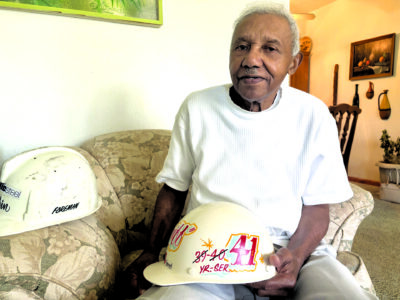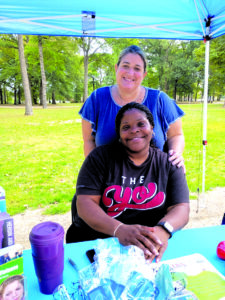Valley sailor toppled race barriers in Navy, career

Correspondent photo / Amanda Smith-Teutsch Charles Griffin, 92, served in the U.S. Navy during the Korean War on the USS New Jersey, which fired on the shores of North Korea during the Korean War. He returned home to Youngstown, where he worked for Republic Steel for 41 years.
YOUNGSTOWN — At 92, Charles Griffin’s voice still carries the cadence of the Deep South, a voice that grew up playing along the red clay roads of Midway, Florida, working in tobacco fields, sailing the world with the U.S. Navy and tempered by decades of quiet resilience.
His story, told from his home on Youngstown’s East Side, is not one of protest signs or fiery speeches but of steady endurance through the shifting tides of American history.
Born in 1933, Griffin spent his early years in a log cabin built for his grandfather after the Civil War. His great-grandmother, Emma Willis, had been enslaved and forbidden to read, yet she passed down wisdom and faith that would guide Griffin for a lifetime.
“She was on the ball,” he recalled. “She’d say, ‘One bad apple can spoil the whole barrel.’ She knew things before I understood them.”
Griffin’s mother, a graduate of Florida A&M, was unable to find work in rural Florida and moved north seeking opportunity, leaving young Charles in his grandmother’s care. She settled in Youngstown and sent for Charles. After spending a summer working in the tobacco fields of Florida, he contracted rheumatic fever.
By the time he was ready to enroll in high school, he was back in Youngstown. He was attending classes at the The Rayen School when he passed up the chance to learn typing — “that was sissy stuff,” he said, echoing the sentiment of the young boys he ran with at the time — and instead went to study hall with his friends.
That, he said, turned out to be a mistake and one he would correct by the end of his military career.
In 1951, Griffin enlisted, hoping to avoid the Army draft and its uncertain future. He was assigned to the USS New Jersey during the Korean War, where he served as a storekeeper — a rare position for a black sailor at the time.
“Most of us were cooks or did laundry,” he said, “but I never scrubbed a deck or washed clothes.”
When he first reported for duty, his commanding officer at first thought the assignment to the ship’s store room must be some mistake, but the orders were correct.
“I was the only black man in the supply department,” he said.
He has skipped on the chance to learn typing in high school, so that denied him the full rate of storekeeper, but his memory and organizational instincts earned him respect. Griffin’s role placed him in charge of inventory and logistics, even coordinating helicopter deliveries of critical equipment to the ships.
“I didn’t realize how good the Lord had been to me,” he said.
He was stationed in Newport, Rhode Island, where he finally had the chance to take the typing classes he had skipped in high school. He called his mother, saying he might have a chance to come home for Christmas, and went off to the school in New York City. He completed the class and returned to report for duty — only to find out was being sent on to meet his ship in Naples, Italy, instead of the trip home. He did make full rate, however — Storekeeper Third Class.
While in the Navy, aboard the New Jersey and later the Columbus, Griffin saw the world. His records show him serving aboard ships that crossed back and forth over the equator, making stops in Europe, Africa, Asia and the Caribbean along the way. He saw active fighting in Korea; the USS New Jersey, a floating fortress, bombarded the shores of North Korea, disrupting communications and supply lines in support of U.S. objectives.
After his discharge in 1955, Griffin returned to Youngstown and began working at Republic Steel. Starting as a laborer, he eventually became the plant’s first black electrician — a promotion that came through steady work and persistence.
“I was a gopher at first,” he said. “But I had seniority and training.”
He moved from the coke plant to finishing to finally, the ability to get more training and become an electrician. He retired as the foreman after 30 years.
“They asked me to stay longer after I retired. I went back and did 10 more years,” he said.
He was presented with a helmet marking his 41 years of service to the company.
Griffin’s quiet persistence broke racial barriers beyond the workplace. In the 1960s, he moved his family into a home on Alameda Avenue, becoming one of the first black homeowners in the neighborhood. A white neighbor, concerned about property values, invited Griffin to meet other residents.
“We sat in his living room and introduced ourselves,” Griffin said. “After that, all the ‘For Sale’ signs came down.”
Griffin’s life is marked by quiet milestones: traveling across the equator, witnessing bullfights in Spain, raising children who played violin and pursued college degrees. He lost his son in a tragic accident and weathered a difficult divorce, but he remains grounded in faith and memory.
“I tell young people, learn all you can,” he said. “You only work so many hours a day for your money. If you pray, don’t worry. And if you worry, why pray?”



